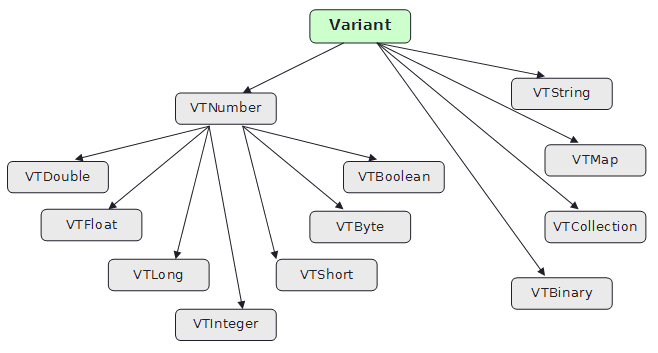
Why is this useful?
- It separates the data structure from the representation so you are not locked into one representation (e.g. XML).
- It is an extremely easy way to serialize data structures, from a simple property map to a complex object tree.
- It provides different serializations for different uses:
- Binary for efficient storage,
- Java/C-style syntax for a compact representation that is human readable,
- XML for compatibility.
- It provides a validation/schema mechanism defined as code (ie. it separates the schema definition from the format).
- It provides an object->variant->object mapper for simple serialization.
package org.boris.variantcodec;
import org.boris.variant.VTCollection;
import org.boris.variant.VTMap;
import org.boris.variant.codec.SourceCodec;
public class VariantCodecExample
{
public static void main(String[] args) throws Exception {
VTMap m = new VTMap();
m.add("var1", "Hello World!");
m.add("num1", 12);
m.add("float1", 23.5f);
m.add("binary1", new byte[] { 3, 4, 4, 5, 5 });
VTCollection c = new VTCollection();
c.add(1);
c.add(2);
c.add(3);
m.add("coll1", c);
System.out.println(SourceCodec.encodeFormatted(m));
}
}
This would output the following:
{
var1="Hello World!";
num1=12;
float1=23.5f;
binary1=<0304040505>;
coll1=[1,2,3];
}
If the above output was stored in a String, you would decode it using the following code:
VTMap m = (VTMap) SourceCodec.decode(s);
System.out.println(m.getString("var1"));
This would output the following:
Hello World!
 VariantCodec
VariantCodec





